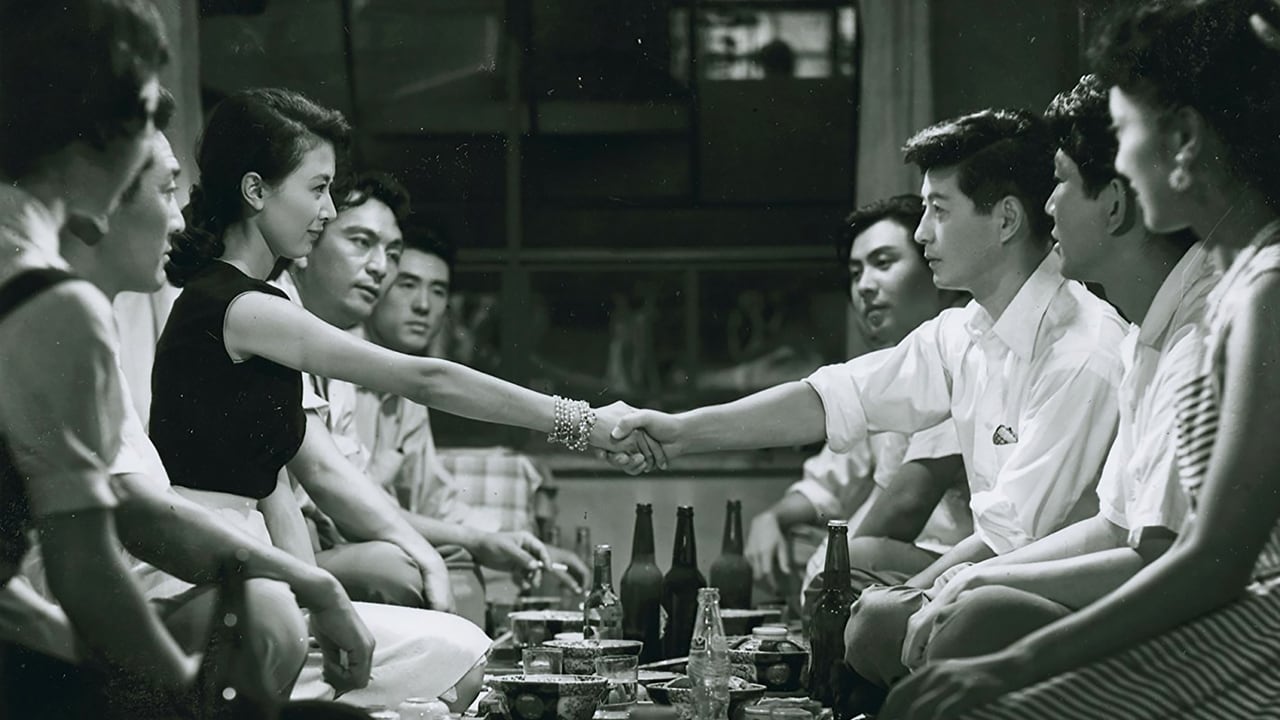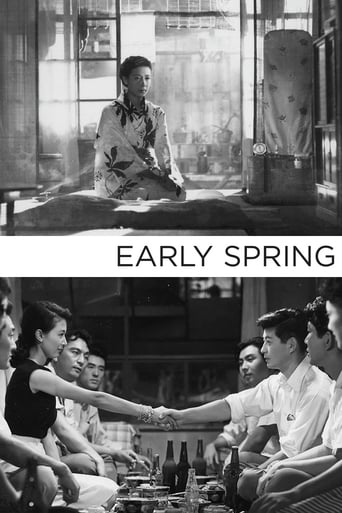Aedonerre
I gave this film a 9 out of 10, because it was exactly what I expected it to be.
StyleSk8r
At first rather annoying in its heavy emphasis on reenactments, this movie ultimately proves fascinating, simply because the complicated, highly dramatic tale it tells still almost defies belief.
Portia Hilton
Blistering performances.
Matylda Swan
It is a whirlwind of delight --- attractive actors, stunning couture, spectacular sets and outrageous parties.
chaos-rampant
Okay, so we expect a certain clarity from cinema about the conundrums of life. In Ozu this appears in a combination of things. The spatiotemporal eye is empty, grounded, it's a dispassionate awareness that sets the room for life to play out. It's more than realism, it's a way of creating realization about the point things are more sensibly viewed from.Narrative then is a matter of having something to view. Here several things blend. Officework for the salaryman in the audience. War reminiscence. A marriage grown distant to illustrate the tension in the home. So each of these threads poses an aspect of life, the idea is that life also extends a bit in this or that direction. This is the opportunity to create that realization that in the first place informs the passage of time. It's not that things were better in the old days, this is never the point in his films. Viewers who miss this are stuck with a sentimental uncle. It's that things are not different, that slightly changed the same conundrums repeat: salarymen are not more distinguished than the old craftsmen, husbands will stray as before and so on. In the same swoop it creates both melancholy and a certain kind of relief.Ozu is quaint then in this sense of being content by the way life envelops and figures itself out, letting the drama peter out as a way of saying it was never worth being caught in. This was most elegantly seen in Early Summer in the girl's spontaneous decision one night to marry. Here the wife in the end makes her choice to follow her husband in his transfer, not because anything has been solved, but because it is now seen to not matter.But he removes the self from the camera only to put it back in the characters. This is a great and difficult balance that to my mind he only accomplished once or twice, how little to show and say. There's no precise answer, just different brushstrokes to try. Push with a little more force and it becomes a moral smudge, push less and maybe there won't be an intelligible trace.Ozu traces faintly the turmoil but too hard the worldly lesson, it seems every minor character is encountered to offer advice at some point. It defeats the whole point of a world that is not yet figured.
SnakesOnAnAfricanPlain
Early Spring came between Ozu's incredible masterpieces Tokyo Story and Tokyo Twilight. No surprise then, that it kind of falls flat in places. It's by no means a bad film, but it adds a bit too much complexity, making the focus confusing at points. The film starts as a comment on the salary man. The opening scenes are both funny and sad, as we see the empty streets of Japan gradually fill with men and women in white shirts. They all come together at the subway station, and then we see two men in an office building looking down at the madness below. These are the kind of details one must love about Ozu. It is all represented there on the screen, and without many words we know what is going on. As the film continues we see the workers on their breaks and finally arranging a weekend trip. On this trip is where the real story begins. A young married man named Shoji is attracted to a young girl nicknamed "Goldfish". They are unable to hide their attraction, as their colleagues start spreading rumors and noticing the smiles between the two. Eventually they give into their temptation. It's the effects after this betrayal that are the key focus. The young girl is surprised that she develops emotions, while Shoji is instantly ashamed of himself. His guilt soon grows, and he avoids his wife. Because of this his wife begins to suspect he is cheating on her. The film shows how destructive guilt can be. As Shoji tries to keep his mind off the affair, he ends up forgetting the anniversary of his son's death. The film is too long for its material. There simply isn't enough going on in the middle, and too much at the beginning and end. What it does offer is Ozu's look at relationships without the arrangement of a marriage. Instead, this shows the hard work and commitment a marriage takes. A theme that was handled a lot more competently and economically in his next feature.
brendastern
"Early Spring" is one of the lesser-known Ozu films, but it is worth watching to complete his view of post-war Japan, and the complexities of returning to daily life. When "Early Spring" was released, Japan was two years into its independence from American occupying forces. Tokyo and other major cities were rebuilding. Lives were getting back to some kind of order -- and with that, the challenges of dealing with a group think society also were present.The relationships in this movie show the influence traditional Japan still held on modern life. The closeness of the wife and her mother; the courtesy that the husband shows the mother in law, even as he simply drops his clothes to the floor for his wife to pick up; the traditional house with few conveniences. For anyone interested in Japanese cuisine, the preparation of oden (a kind of winter stew) is a textbook lesson, but it also weaves in with the plot."Early Spring" lacks the humor and grace of "Early Summer" and it is not as masterful as "Tokyo Story" but it offers an interesting look at the lives of the young salarymen and office girls, at a time when Japan's post-war culture was solidifying. It would be interesting to see a remake, because Japanese life has changed, and yet has remained much the same.
palmiro
Early spring is a time to renew one's hopes, to believe once again that happiness is possible. Sometimes that hope takes the form of betrayal: an extra-marital affair may appear to be the answer to a life that is insufferably routinized and devoid of the thrill of adventure. The "salaryman" (in the US: "white-collar worker") is someone especially vulnerable: he enters the corporation filled with hope for his future, but, we are told, he soon discovers only disillusionment and "dissatisfaction" (a word that surfaces throughout the film). There are, of course, the blandishments of Japan's new consumer society: Note the presence of posters advertising foreign destinations throughout the film (Paris, Colombia, Finland); and note the reference to the withering of the plum trees (Japan's own) on a rich man's estate while bouganvilleas (a foreign import) thrive. But there's little to indicate that Ozu thinks these foreign bagatelles can bring happiness. Indeed, the film has a spareness about it, reflecting a world that has yet to become hopelessly cluttered with objects, which is, as we know too well, the other (the American) solution to dissatisfaction and disillusionment in human relationships and work. Each character tries to shape a life of work and relationships into something satisfying, but there's no simple formula to be found here for happiness in the modern world. There is only the dignity (or lack of dignity) of each individual in their attempt to find happiness. Ozu has brought to life characters who never gush in emotion, who don't even touch one another in the most intimate of reunions (the final husband and wife scene), and whose very restraint makes us feel all the more strongly about them. We feel honored to have shared a part of their lives.

